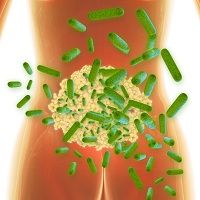Immunotherapy: Target the Gut in Patients with Multiple Sclerosis
Recent studies have revealed clues to the role played by the gut microbiome in a variety of diseases and conditions. Now researchers are looking at whether aberrant immune responses triggered by disruptions in the gut microbiome are to blame for multiple sclerosis.

When Howard L. Weiner, MD, Robert L. Kroc Professor of Neurology at the Harvard Medical School, lost his mother, he began to think more and more about life and its mysteries. What happens when you die?
He travelled the world asking people the big questions in life in his feature-length documentary, What is Life? The Movie (to get an idea of the tone and feel of this film, think: What the Bleep, My Dinner with Andre, and Woody Allen). Life’s big questions about everyday life and medicine are always there and in the end, we all must confront them.
As a doctor, Weiner studies the brain and tries to help people with multiple sclerosis (MS) and Alzheimer’s disease. He knows the mysteries to these diseases will someday be solved and he told a packed house gathered to hear his Presidential Lecture at the 2015 Annual Meeting of the Consortium of Multiple Sclerosis Centers in Indianapolis, Indiana, that epigenetic factors in the gut microbiome may hold the key.
The gut microbiome is one of the hottest fields in research currently and a very important new area in medicine. The total area of small intestine mucosa is 300 square meters and we have as many as 500 trillion bacteria and other organisms in our intestines. And there are more genes in our gut than anyplace else in our body.
In fact, the gut microbiome may not only cause and drive MS, but also hold the key for both treatment and a vaccine. The gut is also involved in short chain fatty acid secretion and vitamin production.
So the gut is doing a lot of things, which isn’t surprising when you realize how important it is and how big it is.
Weiner said together the gut and the microbiome is probably the largest lymphoid organ in the body. So he believes that the gut is most likely the main immune organ, playing a key role in shaping immune responses.
When a mother puts her baby’s pacifier in her mouth before she gives it to her child, that young one grows up with a reduced risk of developing allergies. Mothers who deliver vaginally have healthier children than those delivered by caesarian section.
While conducting research, he discovered it wasn’t that easy to get stool samples from MS patients. So he started telling patients, “We’re trying to develop a vaccine for MS. Would you like to help us?” Then they said yes.
After that, he told patients that he needed a stool sample. But then, they understood that if they one day develop a vaccine affecting the immune system, the gut will be important.
What advice would he give primary care physicians? All patients want to know what they should eat, but there’s no definitive answer for that. But do tell patients to take vitamin D and probably eat a healthy diet.
What’s next? After studying 100 MS patients, he is now going to conduct a larger trial on gut bacteria for a better treatment and, someday, a vaccine.